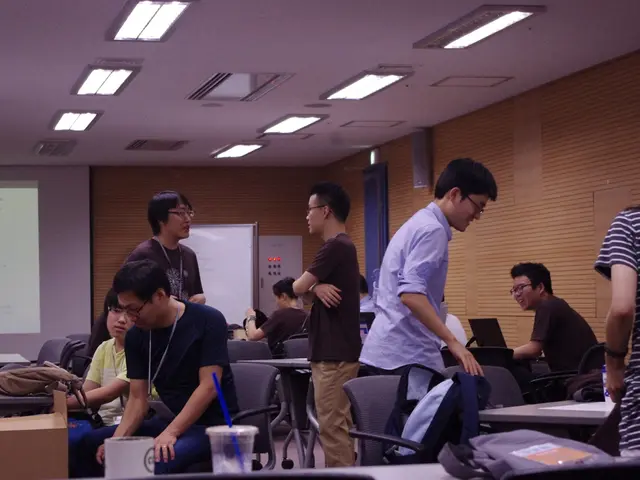Major conglomerates announce substantial employment initiatives aimed at strengthening youth employment and driving future growth
South Korea's leading conglomerates are gearing up for a significant hiring spree in the coming years, focusing on key industries that will drive the country's technological advancement and economic growth.
Semiconductors and AI at the Forefront
Samsung, the largest conglomerate in South Korea, plans to hire 60,000 people over the next five years. The recruitment drive will focus on semiconductors, core components, biotechnology, and artificial intelligence. Samsung Electronics, Samsung C&T, and Samsung Biologics are among the 19 Samsung affiliates participating in the recruitment rounds this year.
SK Group, the second-largest conglomerate, also plans to hire 8,000 people this year, focusing on AI, semiconductors, and digital technologies. SK hynix, the memory chip affiliate of SK Group, will accept applications for new employees from Monday to Oct. 1, targeting roles in chip design, devices, research and development, and manufacturing technologies.
SK hynix also expects thousands of additional jobs once its new chip cluster in Yongin, Gyeonggi Province, begins operations in 2027. Meanwhile, SK hynix is expanding production at its Cheongju M15 fab in North Chungcheong Province for next-generation DRAM, increasing demand for engineers and technicians.
Emphasis on Future-Oriented Businesses
Hyundai Motor Group, another major player, plans to hire 7,200 young workers this year, with potential expansion to 10,000 in 2026. The recruitment will target future-oriented businesses, including electrification, software-defined vehicles (SDV) development, safety, quality control, global market expansion, and brand enhancement. Hyundai Motor Group's recruitment focus includes AI, biotechnology, clean technology, batteries, automotive electronics, heating and cooling systems, and R&D.
Hyundai Motor Group is also expanding its internship programs, currently involving about 400 interns annually, to 800 next year. The company aims to strengthen competitiveness in electric vehicles and software-defined vehicles.
Diversified Recruitment Focus
LG Group's recruitment focus is equally diverse, including AI, biotechnology, clean technology, batteries, automotive electronics, heating and cooling systems, and R&D. The group plans to hire 10,000 people over the next three years, including about 7,000 new graduates.
HD Hyundai Group plans to hire around 1,500 people this year, with a goal of bringing in 10,000 new employees across 19 affiliates over the next five years. Recruitment will focus on shipbuilding, construction equipment, energy, with a particular emphasis on securing research and development talent for eco-friendly technologies, digital smart solutions, hydrogen, and bio businesses.
Posco Group's Recruitment Plans
Posco Group plans to hire 15,000 people over the next five years, with 3,000 hires for this year. The group will also step up recruitment of technical talent such as graduates of vocational high schools and medalists from national skills competitions.
Hanwha Group's Recruitment Drive
Hanwha Group plans to conduct new recruitment rounds across 30 affiliates in the second half of this year, with a total of 3,500 hires.
Samsung's Long-Standing Recruitment Tradition
Samsung was the first Korean company to launch an open recruitment system in 1957. Since then, the company has provided special employment opportunities for more than 1,600 prize winners from national skills events and WorldSkills international competitions.
The impact of these recruitment plans is expected to extend across related industries such as auto parts, steel, and construction. The specific young talents that SK Group, Hyundai Motor Group, LG Group, and Posco Group plan to recruit in the next three years in artificial intelligence, biotechnology, and clean energy technology are not publicly detailed; however, these conglomerates focus on attracting top graduates and experts in AI, biotechnology, and renewable energy innovation from leading universities and research institutes.
These ambitious recruitment plans underscore South Korea's commitment to maintaining its position as a global leader in technology and innovation.





